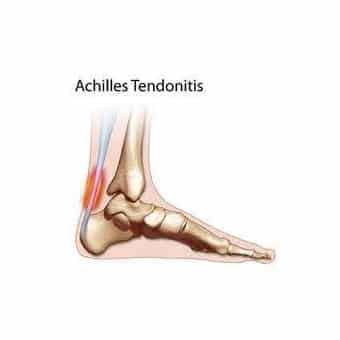Now accepting Telehealth appointments. Schedule a virtual visit.
The Achilles tendon, capable of withstanding forces of over 1,000 pounds, is the largest tendon and the longest tendon in the body. Connecting the calf muscle to the heel, the Achilles’ tendon soft tissues are commonly ruptured by both professional and recreational athletes due to overuse and repetitive strain.
Starting a new exercise routine or intensifying an existing regiment can both contribute to Achilles tendon injury. Overuse, intense elevations, failure to stretch adequately, trauma, and improper footwear can also lead to Achilles tendonitis.

Frequently, Achilles tendonitis consists of mild pain from running or exercise that gradually intensifies. Other symptoms of Achilltendonitisnis include:
Achilles tendonitis can be diagnosed and treated by a podiatry specialist. Treatment regimens include compressive bandages to reduce swelling, nonprescription or prescribed orthotic shoe inserts, an-inflammatory medication, rest, and strengthening exercises.
This pathology is common in athletes, flat feet and “weekend warriors.” If not treated properly, can lead to rupture of the Achilles’ tendon. Hopefully patients see a podiatrist before this occurs.
Your feet support you all day – support them back with a little help from the professionals at Cutting Edge Foot and Ankle Clinic. If you are experiencing any pain or swelling in the Achilles region don’t wait; schedule an orthopedic consultation today for the best chance at a full recovery.
Achilles tendinitis is inflammation of the Achilles’ tendon which connects your calf muscles to your heel bone due to overuse, stress on the tendon, this is usually short lived. If not taken care of properly it can progress to damage of the Achilles tendon including micro tears, degeneration of the tendon and thickening of the tendon, patient experiences chronic pain.
You may need to immobilize it either with each a walking boot or cast.
To reduce the inflammation, Ice and NSAIDs can help.
Daily posterior calf stretching at home, or utilizing a night splint can help. It maybe so severe you will need physical therapy, which includes stretching and strengthening of the tendon.
Using custom orthotics can help correct overpronation and alleviate stress on the Achilles’ tendon. Supportive shoe gear is a must also.
If conservative treatment fails, surgery is the last option which includes Achilles’ tendon repair. If you are experiencing pain, tenderness along the course of the Achilles tendon, or at the insertion (back of your heel).
Your feet support you all day – support them back with a little help from the professionals at Cutting Edge Foot and Ankle Clinic. If you are experiencing any pain or swelling in the Achilles region don’t wait; schedule an orthopedic consultation today for the best chance at a full recovery.
Achilles tendinitis is inflammation of the Achilles’ tendon which connects your calf muscles to your heel bone due to overuse, stress on the tendon, this is usually short lived. If not taken care of properly it can progress to damage of the Achilles tendon including micro tears, degeneration of the tendon and thickening of the tendon, patient experiences chronic pain.
You may need to immobilize it either with each a walking boot or cast.
To reduce the inflammation, Ice and NSAIDs can help.
Daily posterior calf stretching at home, or utilizing a night splint can help. It maybe so severe you will need physical therapy, which includes stretching and strengthening of the tendon.
Using custom orthotics can help correct overpronation and alleviate stress on the Achilles’ tendon. Supportive shoe gear is a must also.
If conservative treatment fails, surgery is the last option which includes Achilles’ tendon repair.
If you are experiencing pain or tenderness along the course of the Achilles tendon, or at the insertion (back of your heel), then reach out to ur practice today so that we can work with you on discovering the least invasive solution!